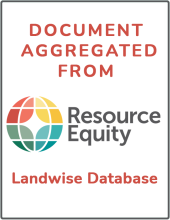Land Library Search
Through our robust search engine, you can search for any item of the over 73,000 highly curated resources in the Land Library.
If you would like to find an overview of what is possible, feel free to peruse the Search Guide.
/ library resources
Showing items 1 through 9 of 44.markdownabstractUsing empirical case materials from the Philippines and referring to rich experiences from different countries historically, this book offers conceptual and practical conclusions that have far-reaching implications for land reform throughout the world.
At the end of Apartheid, approximately 82 million hectares of commercial farmland (86% of total agricultural land, or 68% of the total surface area) was in the hands of the white minority (10.9% of the population), and concentrated in the hands of approximately 60,000 owners (Levin
Possession of vast lands is a major representation of wealth in the Philippines - a privilege enjoyed largely by the ruling class since the colonial era. This ownership of huge tracts of land has resulted in numerous political, social, and economic inequalities.
Secure access to resources is now recognised in human rights discourse as a universal condition of human well-being. This paper aims to contribute to the theoretical and empirical understanding of land tenure as a human rights issue, by analysing recent land tenure policy in South Africa.
This study is an effort to understand the relationship between HIV/AIDS and land reform in South Africa. It is conceptualised as a longitudinal study covering three years.
A decade ago, Rwanda embarked on a major land reform programme. The government envisaged a new land law, supported by a land policy, and claimed that the new tenure system would contribute to enhancing food production, social equity and the prevention of conflict.
Contemporary discourse on land in Africa is polarized between advocates of tenure reform through state registration of individual titles to land and others who claim that customary or 'communal' tenure is the only check against landlessness among the poor in the African countryside, and that 'pro






